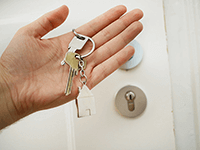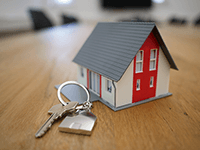
Getting a mortgage with defaults can be difficult, but there are steps you can take to improve your chances.
In this article we will discuss the impact of defaults, what they are, what to expect when applying for a mortgage and how to increase your chances of being approved.
Can I get a mortgage with defaults?
Yes, it is possible to get a mortgage with defaults, however it may be more difficult than if you had a clean credit history. Some lenders may perceive a borrower with defaults to be a higher risk, which can result in higher interest rates or being rejected for a mortgage altogether.
However, some specialist lenders will be familiar with borrowers who have defaults. They may be willing to offer more flexible terms or accept a large deposit to mitigate risk.
What are defaults?
Defaults are an accumulation of missed payments on your credit accounts, causing the lender/creditor to close down an account. For example, if you consistently fail to pay your mobile phone contract, your provider could shut down your account. Defaults are recorded on your credit report and can negatively impact your credit score and creditworthiness. This can make it harder for you to access credit in the future.
You are notified of a default through a default notice. This is a formal, written notice from the lender, letting you know that you have defaulted on a loan or credit agreement. This will also inform you of how you can rectify the default, such as paying the outstanding amount, setting up a payment plan or contacting the lender to discuss your options. If you fail to rectify the default in the time period the lender sets out, you risk the lender taking legal action against you.
The impact of defaults on your credit score
Defaults can have a significant impact on your credit score. The impact will depend on the severity of it, the amount of money owed, and how long ago it occurred. A default may stay on your credit history for several years, which can make it harder to access credit in the future. For more information on credit histories, have a look at our ‘credit history’ article.
Due to this, lenders may view you as a higher risk borrower, and they may charge you higher interest rates or fees. This can result in higher monthly payments, potentially making it harder to manage your finances.
Additionally, having defaults on your credit score can limit your access to credit and loans. Many lenders may either reject your application or offer you less favourable terms. This can make it more difficult to apply for mortgages, car loans or credit cards.
In some cases, your credit score may even be taken into account when applying for a job or rental accommodation. If you have defaults on your credit score it could impact your ability to secure certain types of employment, especially in industries such as law or finance. Similarly, landlords may view you as higher risk if you have defaults on your credit score. They may believe that you might not pay rent on time, and you may be rejected from renting their property.
How to improve your chances of getting approved
There are a few steps you can take to improve your chances of getting approved for a mortgage with defaults:
- Save a larger deposit- The larger your deposit, the less risk you present to the lender. This may improve your chances of being approved.
- Pay off other debts: If you have other debts, such as a car loan or credit card debt, paying them off can improve your credit score and make you a more attractive borrower. Also try to avoid creating more debt for yourself, have a look at our ‘top strategies on how to avoid future debt’, for more information on this.
- Prepare additional documentation: If you have defaults on your credit record, the lender may ask you for additional documentation to assess your risk. This could include, proof of income, bank statements, proof of deposit and additional references.
- Consider involving a guarantor: A guarantor is someone who agrees to pay your mortgage if you are unable to. This makes you less of a risk to the borrower, and can improve your chances of getting approved.
If you would like some more advice on getting a mortgage, you might find our blog on ‘how to improve your chances of getting a mortgage’ useful.
What to expect when applying for a mortgage with defaults
When applying for a mortgage with defaults on your credit report, it’s important to understand what to expect.
You may face higher interest rates when you have defaults on your credit score. This is because some lenders will view you as higher risk. You may have to be prepared to pay more interest over the term of your mortgage than someone with a better credit score.
Also, you may need to put down a larger deposit. This will help the lender mitigate any risk with your mortgage. This could be anywhere between 10% or 25% of the property’s value.
The application process may be more rigorous for someone with defaults on their credit score. This may include providing additional documentation and affordability checks. It may also take a longer time to process your application because of these extra checks. Be prepared to be patient, as you may have to wait a while to find out if you have been approved.
Alternative options: Other paths to homeownership with defaults
If you have struggled to get accepted for a mortgage due to defaults, it may be worth considering other options that are available to you.
Firstly, it may be worth speaking to a specialist lender or broker if you haven’t already. Specialist lenders and brokers will be more used to offering mortgages to borrowers with bad credit. The options they can provide may come with higher interest and fees, but can be a viable option if you have been rejected elsewhere.
Another option you could consider is a shared ownership mortgage. This is a solution that allows you to buy a percentage of a property, rather than the whole property. It can be a handy option if you are looking for a way onto the property ladder with defaults. You can buy additional portions of the property over time as your financial situation improves.
You may also consider getting a joint mortgage, which involves applying for a mortgage with a partner or family member who has good credit. The lender will consider both of your credit histories when assessing your application, which could increase your chances of being approved.
There are also a few other government buying schemes that are designed to help people get onto the property ladder. To find out more, check out our ‘guide into government buying schemes’.
Seeking professional advice from a financial adviser, or speaking to a broker could help you better understand the options available to you.
Summary
Getting a mortgage when you have defaults on your credit score can be a challenge, but it is by no means impossible. Understanding the impact of defaults on your credit score, finding a suitable lender, and taking steps to improve your credit can help you get approved.
If you are unable to get a mortgage, there are other routes to homeownership available to you. By seeking professional advice, and being prepared you can improve your chances of getting a mortgage with defaults.
Think carefully before securing other debts against your home. Your home may be repossessed if you do not keep up repayments on a mortgage or any other debt secured on it.




